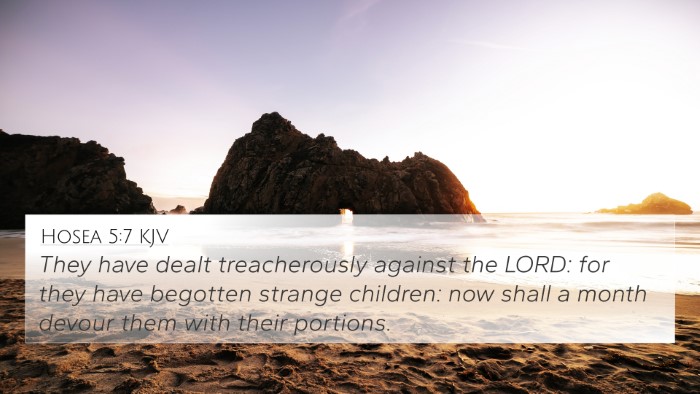Understanding Jeremiah 5:11
Jeremiah 5:11 states: "For the house of Israel and the house of Judah have dealt very treacherously against me, saith the Lord." This verse reflects God's profound disappointment with His people, highlighting their unfaithfulness and betrayal.
Commentary Insights
Matthew Henry's Commentary
Matthew Henry emphasizes that this verse illustrates the deep betrayal of Israel and Judah. He notes that the term "treacherously" shows not just deceit but a serious violation of the covenant relationship with God. Henry underscores the fact that God had showered His people with love, yet they rejected Him, breaking their promises and living in sin. This passage serves as a warning about the seriousness of covenant unfaithfulness.
Albert Barnes' Remarks
Albert Barnes points out that this particular claim of treachery was directed towards both the northern tribes (Israel) and the southern tribes (Judah). He notes that the phrase indicates a deliberate and calculated betrayal against a faithful God, highlighting the moral and spiritual decay present among the people. Barnes encourages readers to reflect on the implications of such unfaithfulness and the ramifications that follow.
Adam Clarke's Interpretation
Adam Clarke interprets Jeremiah 5:11 as a poignant reminder that despite God’s merciful offers to His people, they consistently turned away from Him. Clarke contextualizes this verse in the wider narrative of Jeremiah's prophecy, where he calls the people to repentance. He stresses the urgency of returning to God to avoid impending judgment, which is a recurring theme in Jeremiah.
Key Themes and Connections
This verse connects deeply with themes of covenant unfaithfulness, emphasizing the relationship between God and His people. The following cross-references enrich the understanding of this verse:
- Hosea 6:7 - "But like Adam they transgressed the covenant; there they dealt treacherously with me." This connects with the theme of betrayal in covenant relationships.
- Ezekiel 18:30 - "Therefore I will judge you, O house of Israel, every one according to his ways, saith the Lord God. Repent, and turn yourselves from all your offenses." This reflects on individual accountability and the call to repentance.
- Isaiah 1:2-4 - "Hear, O heavens, and give ear, O earth: for the LORD hath spoken... they have rebelled against me." These verses show the rebellious nature of Israel.
- Malachi 2:10 - "Have we not all one father? hath not one God created us? why do we deal treacherously every man against his brother?" This highlights the communal aspect of unfaithfulness.
- Psalm 78:57 - "But turned back, and dealt unfaithfully like their fathers." This connects Israel’s history of betrayal.
- Jeremiah 3:20 - "Surely, as a wife treacherously departs from her husband, so have ye dealt treacherously with me, O house of Israel, saith the LORD." This reinforces the marital metaphor often used for God's relationship with His people.
- James 4:4 - "Ye adulterers and adulteresses, know ye not that the friendship of the world is enmity with God?" This New Testament verse parallels the Old Testament themes of unfaithfulness.
- 1 Chronicles 10:13-14 - "So Saul died for his transgression... because he asked counsel of one that had a familiar spirit." This reflects the consequences of betrayal against God's ways.
Reflection on the Verse
When interpreting Jeremiah 5:11, it is essential to grasp the gravity of the betrayal against God. This can inspire readers to examine their personal and communal relationships with God. The verse serves both as a historical account and a timeless warning regarding fidelity in spiritual matters.
Tools and Resources for Further Study
For those seeking to dive deeper into cross-referencing Biblical texts and related themes, consider utilizing various tools:
- Bible Concordance - An essential tool for looking up verses and finding related scriptures.
- Cross-Reference Bible Study Guides - These guides help in identifying connections between different Bible verses.
- Comprehensive Bible Cross-Reference Materials - Great for extensive studies on inter-Biblical themes.
- Bible Chain References - Allows you to follow a series of related verses seamlessly.
Conclusion
Jeremiah 5:11 is more than just a historical text; it serves as an ongoing dialog between God's expectations and humanity's actions. By utilizing the various cross-referencing tools available, believers and scholars can unveil the richness of God's word, find thematic connections, and deepen their faith through a better understanding of the scriptures.







